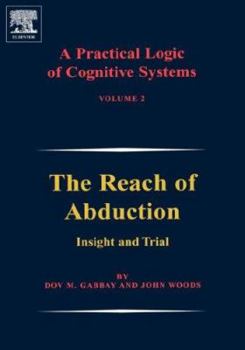A Practical Logic of Cognitive Systems: The Reach of Abduction: Insight and Trial
Select Format
Select Condition 
Book Overview
The coverage of the book is extensive, from the philosophy of science tocomputer science and AI, from diagnostics to the law, from historical explanation to linguistic interpretation. One of the volume's strongest contributions is its exploration of the abductive character of criminal trials, with special attention given to the standard of proof beyond a reasonable doubt.
Underlying their analysis of abductive reasoning is the authors' conception ofpractical agency. In this approach, practical agency is dominantly a matter of thecomparative modesty of an agent's cognitive agendas, together with comparatively scant resources available for their advancement. Seen in these ways, abduction has a significantly practical character, precisely because it is a form of inference that satisfices rather than maximizes its response to the agent's cognitive target.
The Reach of Abduction will be necessary reading for researchers, graduatestudents and senior undergraduates in logic, computer science, AI, belief dynamics, argumentation theory, cognitive psychology and neuroscience, linguistics, forensic science, legal reasoning and related areas.
Key features:
- Reach of Abduction is fully integrated with a background logic of cognitive systems.- The most extensive coverage compared to competitive works.- Demonstrates not only that abduction is a form of ignorance preservinginference but that it is a mode of inference that is wholly rational.- Demonstrates the satisficing rather than maximizing character ofabduction.- The development of formal models of abduction is considerably more extensive than one finds in existing literature. It is an especially impressive amalgam of sophisticatedconceptual analysis and extensive logical modelling.





